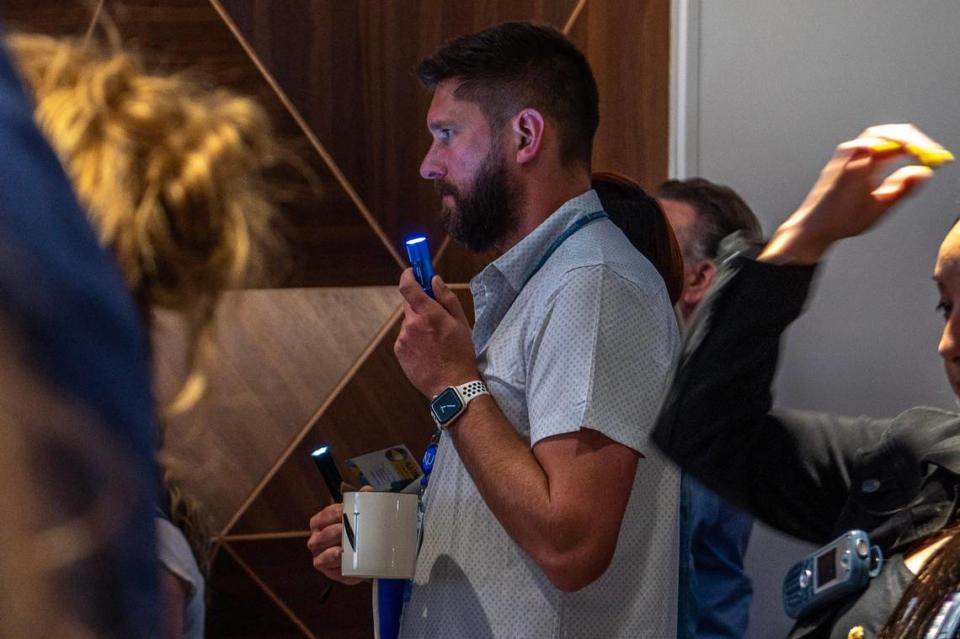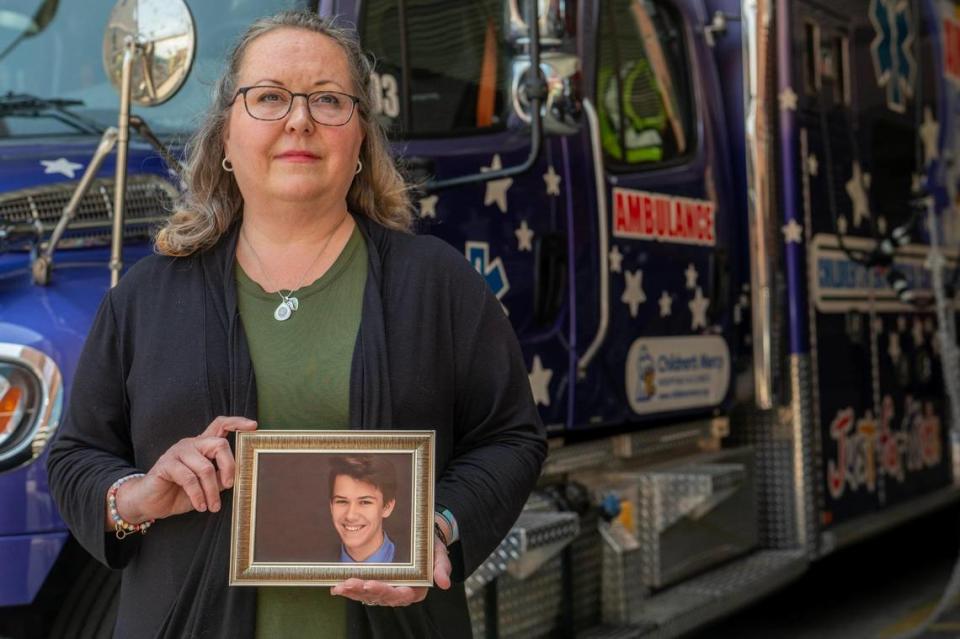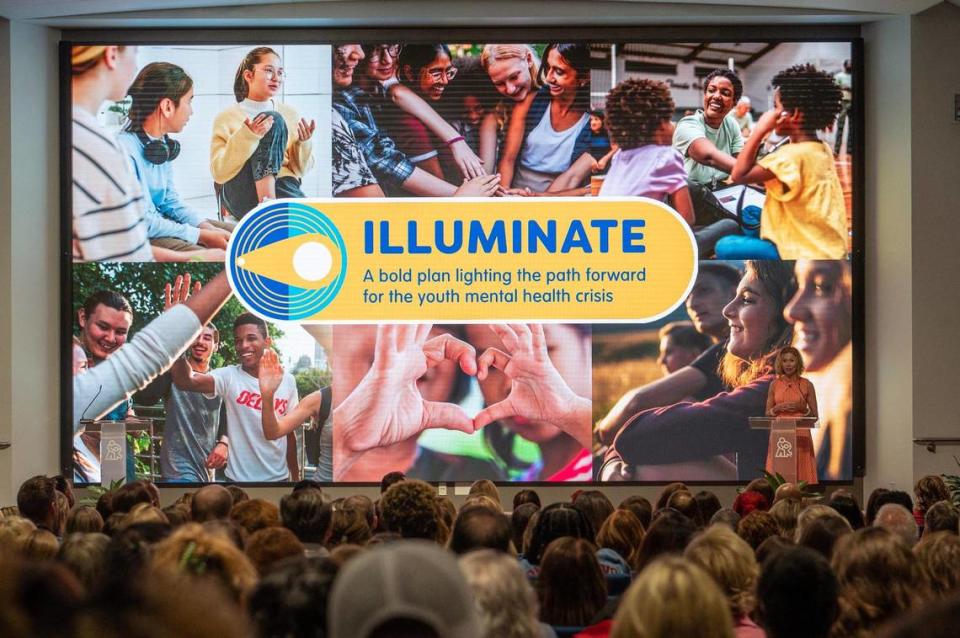KC Children’s Mercy unveils ‘bold’ $275 million effort to fight kids’ mental health crisis
Children’s Mercy unveiled a $275 million plan Thursday to battle the unrelenting mental health crisis among youth, a call to arms for the community that could help more than 80,000 children and teens in the Kansas City region.
Hospital officials call the effort unprecedented and necessary because 40% to 50% of children in Missouri and Kansas who need mental health services currently don’t get them, worse than the national average.
And they need the help now.
Sometimes, young people show up in the Children’s Mercy emergency department without their parents, in the throes of a mental health crisis, because they don’t know where else to turn.
The hospital’s new five-year plan focuses on early intervention to help children before they experience such mental health emergencies, expanding its menu of behavioral and mental health services, creating more inpatient hospital care and investing in mental health research that clinicians can use in their daily work, like information about medications.
The hospital has created 14 projects to streamline diagnosis, expand access to care and grow the supply of mental health care providers — the shortage is nationwide — to help children with depression, anxiety, eating disorders, ADHD and autism.
And, it includes $100 million worth of capital projects that will create spaces where children can get that care, including an inpatient mental health campus, an integrated inpatient care unit and acute mental health crisis center.
The goal for families and caregivers: A quicker, easier, streamlined journey through the gauntlet of the health care system, particularly stressful when looking for mental health services.
This is not a plan to “just check a box and say ‘well, we did stuff,’” Paul Kempinski, the hospital’s CEO and president, told The Star.
“It’s a commitment I wish we didn’t have to make, but unfortunately what’s been happening across the country, across the region and even inside Children’s Mercy tells us to act in a bold and visionary way to address the mental health crisis.
“The statistics are pretty daunting in terms of the number of children who need access to mental behavioral health services who currently can’t get access to them.
“This was a crisis that was brewing well before COVID hit, but then COVID really put it into hyperspace and I think really exacerbated the issues that were occurring before then.
“We’ve seen at Children’s Mercy the manifestation of that. We see it in the hospital and in specialty programs and even in the community where we partner with community pediatricians. We see it in the schools, we even see it in the home.
“So we made a deliberate decision that we felt was not discretionary, that we had to act and we have to expand access and create impact.”
A $50 million grant from the Sunderland Foundation in Kansas City kickstarted the $275 million initiative. In a statement, foundation chairman Kent Sunderland called the breadth of the youth mental health crisis “staggering.”
The hospital will invest $125 million and will need $150 million in philanthropic money for the capital projects, program start-up costs, staff and to cover anticipated losses created when private insurers reimburse providers less for mental health services than other health care, a national problem.
A capital campaign to raise the money will come later, Kempinski said.
“It has to be sustainable,” he said. “And it is going to take the support of the community and people and organizations who have the ability to help impact this crisis, and those who are impacted by it as well.”

‘All hands on deck’
During the pandemic, the mental health crisis slammed into hospitals, including Children’s Mercy, like a tsunami.
In 2021, “Code Strong” emergencies at Children’s Mercy rose by 1,200 percent, Kempinski said. Those require a team, sometimes involving security officers, to help a patient experiencing an acute mental health crisis like significant anxiety or suicidal thoughts.
Last year, more than 3,000 children arrived in the hospital’s emergency department experiencing some type of acute mental health crisis, he said.
But right now, the Kansas City region doesn’t have enough inpatient psychiatric beds for those pediatric patients who need one, mirroring another nationwide shortage.
Currently “there are only about 166 inpatient psychiatric beds to serve children in the entire region. So we have to expand inpatient capacity, and that really is that safety net,” Kempinski said.
“Unfortunately, right now, we don’t have an inpatient psychiatric unit. We don’t have all the capabilities that we will have when we implement this bold strategy to help care for those kids.”
Dr. Sarah Soden, a developmental pediatrician and division director for developmental and behavioral health at Children’s Mercy, said her colleagues are eager “to do more.”
“We see the kiddos that we’re helping but we’re very acutely aware of those that need help and aren’t getting it, and those kids keep us up at night,” she told The Star. “So to be able to spread our wings and help even more of those young people ... is a dream come true.”
Soden described the initiative as “all hands on deck.”
“We cannot do this alone,” said Kempinski. “We need to partner with everybody in the community, with parents, with schools, with community pediatricians, with the payers and other organizations.
“This will be impactful, sustainable and collaborative.”
A mother loses her son
The plan was to be unveiled Thursday at the Children’s Mercy Research Institute, where invited guests included families that have suffered some of the worst outcomes of this crisis.
The Children’s Mercy family itself has felt it personally. It has changed Heather Scruton’s job at the hospital and devastated her family at home.
She is a registered nurse and assistant director of the hospital’s Critical Care Transport team, which works 24/7 to transport patients by land and air.
“Our teams have really been impacted, even before COVID,” Scruton told The Star. “We saw a much larger number of calls for help with kids who were in mental health crisis. Our team was designed to help kids with critical illness and not necessarily mental illness. But the systems in our city are overwhelmed.
“We have so many kids who need help and so we started trying to help where we could too, but it’s hard because there aren’t enough places for these kids to go in our area, which means they have to go away from their support systems.
“There are often kids waiting in emergency departments because they’re not safe to go home. They’re not necessarily able to get inpatient admission at available mental health treatment centers. So we understood very early on that this was a crisis that was going to get worse. And certainly with COVID we saw that happen.”
The worst day for her came on Aug. 22, 2021, when her 21-year-old son, Adam, died by suicide. He had suffered with depression and anxiety for several years.
“And when he was younger, I struggled to get him the care he needed,” Scruton said. “There weren’t enough resources. There were long waits to see doctors. And even when we found doctors they weren’t always a great fit.
“Which, if your child doesn’t like their pediatrician you can shop around and find a better fit. But there weren’t options. And so he never really saw the value of that kind of mental health treatment.”

Then, Adam turned 18 and was unsure that he could benefit from any mental health care because of how hard it had been to find it before, “and he was quite sure he couldn’t navigate a complex system that his nurse mother had trouble with,” she said.
“So, it was too late for him.”
A mental health game plan
A priority, Kempinski said, “is to do a much, much better job of creating access for children, so that they can get the appointment they need. But it’s more than that.
“It’s coordinating the overall care for that child and family, because they are typically going to have to see a number of different specialists at different times, at different places, so we want to coordinate that care better so the child gets access to the care they need, when they need it, with the person, the caregiver they need, at the right time and location.”
Soden said only a few other hospitals across the country have tried something like this, which boils down to Children’s Mercy amping up what it already provides children.
“One of the fun aspects of getting going is we’re doing a lot of hiring, and so we have a lot of young candidates coming through, young professionals,” Soden said.
”And when they come through and we interview them, and they hear what we have planned, their eyes are wide. And we’ve had incredible luck with our recruitment and I know that’s because they see this very tangible vision coming to life and they want to be part of it.”
Some of the hospital’s new projects have already started. The first was the Depression and Anxiety for Youth Clinic, “a passion project of mine,” said Soden.
“For years we recognized that one of the largest kinds of clinical groups of patients that were calling for our services and we weren’t able to meet their needs were dealing with depression and anxiety,” she said.
“We were able to treat subsets of those patients in the past if they had a medical condition, if they were a Mercy patient with other medical conditions and also depression and anxiety. We were treating those kiddos.
“But the larger population of youth with depression and anxiety in the community, we really weren’t set up to meet their needs.
“So we conceived of a clinic that could do that in a really comprehensive way, using medical providers, psychiatrists, advanced practice nurses, psychologists, licensed social workers, individual therapy, group therapy, really comprehensive care. A lot of education for families and friends.”
The hospital also has already expanded its outpatient eating disorder center, responding to demand that skyrocketed during the pandemic. The plan also calls for:
▪ Doing more with more schools. Develop programs for educators and integrate mental health care and behavioral therapy services into school-based programs.
▪ Expanding social work services to help reach families that need interventions.
▪ Streamlining diagnosis for patients with suspected ADHD to connect them with treatment more quickly.
▪ Expanding services for children diagnosed with autism, including yearly visits to monitor their development and help reduce the need for emergency services.
“Research and innovation will be driving all of these advancements,” Kempinski said. “We have this incredible Children’s Mercy Research Institute and a huge priority is to understand to a great extent the precursors that exist for a child who might need mental and behavioral health services, and we’re even beginning to understand those precursors at infancy now.”
Lighting the path
Hospital officials speak of the plan as “illuminating” the mental health needs of the Kansas City area, turning a spotlight on the problem. They’re happy that fewer people are afraid to talk mental health now, a trend led by young people themselves that is breaking down old stigmas.

In the past, Kempinski said, “and this is a little bit of human nature, unfortunately mental health disease has not been looked at as sort of another one of the diseases and disorders that we deal with as a children’s health system.
“There’s been a stigma associated with it. There has been perhaps a sense that, gosh, if one of my children has a mental health condition, that is some example of a failure on my part as a parent, or ... perhaps I’m to blame. Well, that’s not the case.
“Mental behavioral health is an array of diseases that are not dissimilar to ... pulmonary disease or heart disease or cancer. So we have to mainstream our thinking on what it is so that we can be transparent about the crisis that is in front of us and we can begin to address it collaboratively without worrying about that stigma being attached to the conversation.
“What we’ve learned really is that children themselves, in the schools, on the playgrounds, in the home, are talking about it amongst themselves. And they’re basically telling us as parents, don’t worry. This is happening, it’s real. Help us.”

When Scruton’s son died her colleagues raised money to create a scholarship in his name. The money is available to Children’s Mercy employees who want mental health training.
She said the new plan acknowledges that Children’s Mercy “must lead these efforts. We’re the pediatric experts and we recognize the need and we’re going to put our resources behind it, we’re going to put our experts behind it,” she said.
“You can talk to any employee, they will tell you we understand our mission, we understand our vision, we want to make the children in our community healthier.
“Healthier today does not just mean free from disease or free from injury. It means that their mental health needs are being addressed.
“So I think Children’s Mercy absolutely has prioritized that in the right direction, and as the mother of a child who was lost to this disease, that gives me hope.”


